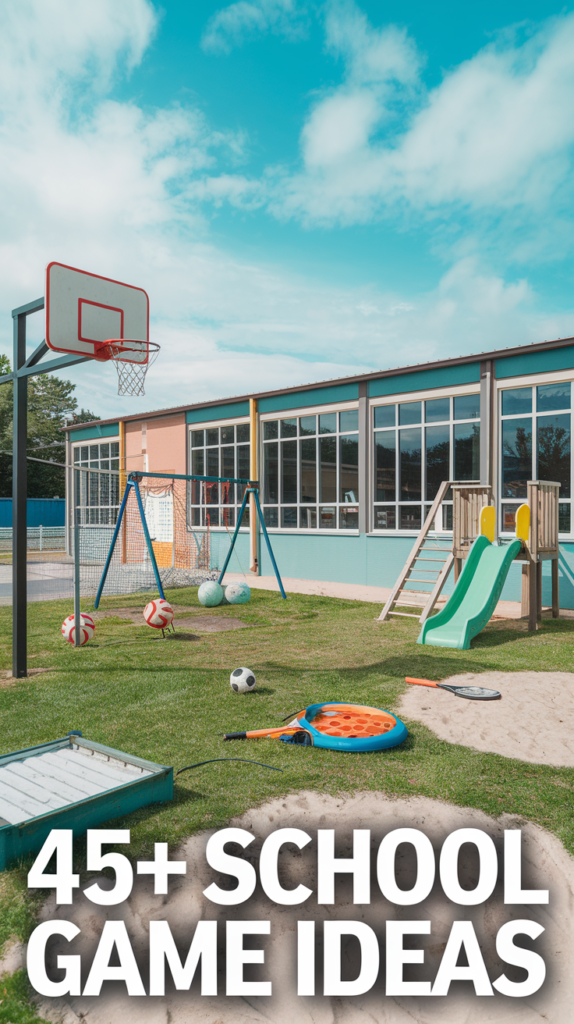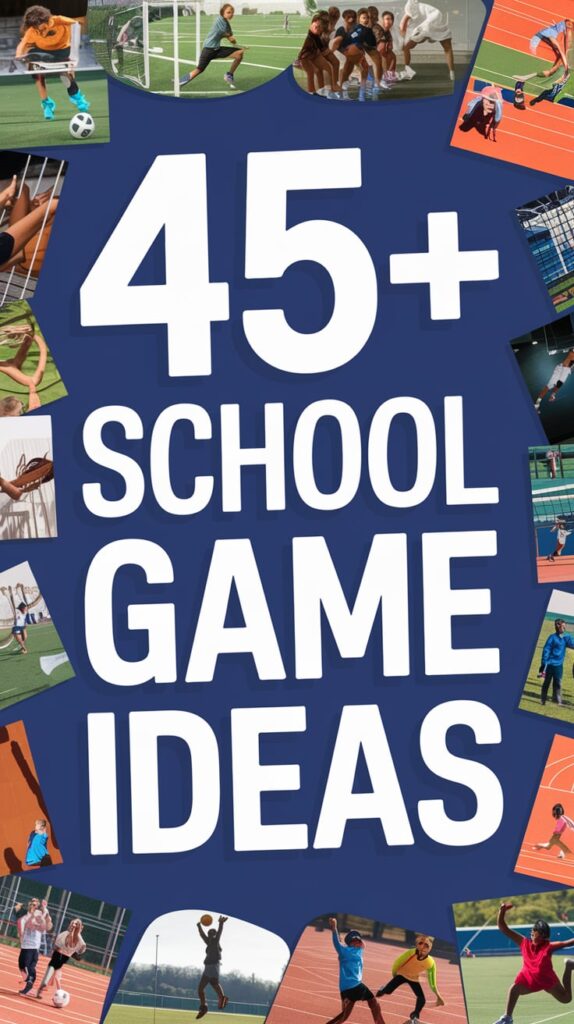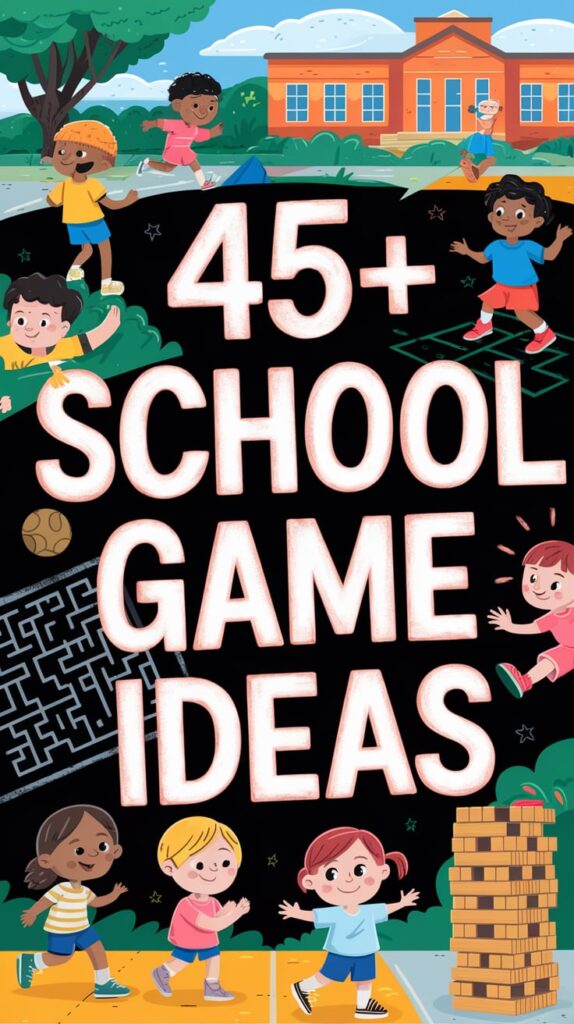School game ideas offer a wonderful way to engage students in fun and educational activities that promote teamwork, problem-solving, and social interaction. These School Game Ideas can range from physical challenges like relay races, tug-of-war, or obstacle courses to indoor activities such as trivia quizzes, charades, and scavenger hunts. In academic settings, games like spelling bees, math relays, and word association help reinforce learning in an enjoyable way.
Classroom games, such as “Around the World” (a quick math challenge game), or “Silent Ball” (a quiet teamwork activity), encourage focus and collaboration. Group activities, such as “Capture the Flag” or “Simon Says,” are also fantastic for outdoor recess or physical education, providing students a break from academics while enhancing their listening and coordination skills. School games can be adapted for different age groups and spaces, from classrooms to gymnasiums, allowing educators to foster creativity and engagement in a variety of settings.
School Game Ideas
Here’s a list of fun and educational school game ideas for various classroom settings:
1. Educational Games
- Math Bingo
- A bingo game using math problems instead of numbers. Students solve the problems to fill their bingo cards.
- Spelling Bee
- A classic game where students compete to spell words correctly.
- Jeopardy!
- Create a quiz game with categories related to different subjects like science, history, and literature.
- Word Search Race
- Provide students with a word search and challenge them to complete it first.
- Flashcard War
- A game to help with quick recall of facts or vocabulary. Students flip flashcards and the fastest to answer correctly wins.
- Math Relay
- Divide the class into teams. Each team answers math questions and races to complete their problems.
- Pictionary
- A drawing and guessing game using subject-specific words (like math, history, or literature terms).
- Vocabulary Tic-Tac-Toe
- A twist on the classic game, where students answer vocabulary questions to earn a spot on the board.
- Trivia Quiz
- Host a quiz game with trivia questions from the school’s curriculum, such as geography, science, or history.
- Memory Match
- Use cards with terms and definitions or questions and answers. Students match pairs to win points.
2. Outdoor Games for School
- Capture the Flag
- Teams race to capture the opposing team’s flag without being tagged. Great for outdoor play.
- Tug of War
- A classic team-building game where students use strength to pull a rope in opposite directions.
- Kickball
- A fun alternative to baseball, where players kick a rubber ball instead of hitting a baseball.
- Relay Races
- Students compete in a relay race with various obstacles or tasks at each checkpoint.
- Giant Jenga
- A larger-than-life version of Jenga that requires students to work together to avoid the tower from falling.
- Four Square
- A playground game where students bounce a ball in a square grid, trying to keep it within the boundaries.
- Sharks and Minnows
- One student is the “shark” and tries to tag other students (“minnows”) who try to run across the field without being caught.
- Kick the Can
- A mix of tag and hide-and-seek where one player guards the can, and others try to kick it over.
- Parachute Games
- Use a large parachute for various fun games like making waves or hiding under it.
- Sack Race
- Students hop in burlap sacks to the finish line. The first to cross the line wins.
3. Classroom Games
- Classroom Bingo
- Use a bingo card with class-related tasks (like “answer a question,” “raise your hand,” etc.) for students to complete.
- Hot Seat
- One student sits in the “hot seat” and answers questions from the class about a subject being studied.
- 20 Questions
- One student thinks of an object, and the rest of the class asks up to 20 yes/no questions to guess it.
- Simon Says
- A fun game where students must only follow commands that start with “Simon says.”
- Two Truths and a Lie
- Each student shares two truths and one lie about themselves, and the class tries to guess which is the lie.
- Mystery Word
- A student describes a word (without saying it directly), and the class tries to guess it.
- Find Someone Who
- Give students a list of characteristics (e.g., “find someone who has a pet”) and have them find classmates who match each one.
- Classroom Scavenger Hunt
- Hide various objects around the classroom, and students must search for them based on clues.
- Paper Airplane Contest
- Have students create and fly their own paper airplanes. Measure the distance or accuracy for fun competition.
- Guess the Sound
- Blindfolded students try to guess different sounds (animal sounds, instruments, etc.) made by their classmates.
4. Team-Building Games
- Trust Fall
- One student falls backward into the arms of their classmates, helping to build trust.
- Human Knot
- Students stand in a circle, grab hands with two people across from them, and then work together to untangle the knot without letting go.
- Group Storytelling
- Each student adds one sentence to a story, and the next student continues from where the last one left off.
- Tower Building
- Teams use marshmallows and spaghetti to build the tallest tower in a given time.
- Problem-Solving Challenges
- Present students with a scenario and have them work together to find a solution.
- Balloon Pop Challenge
- Teams pop balloons by sitting on them or using other creative methods.
- Minefield
- Blindfolded students navigate an obstacle course with verbal instructions from their team members.
- Egg Drop
- Teams design a contraption to protect an egg from a high drop using materials like straws, paper, and tape.
- Scavenger Hunt (Team Version)
- Split the class into teams and give them a list of items to find around the school or classroom.
- Marble Run
- Teams must design and create a track for marbles to travel through using materials like cardboard, tape, and straws.
5. Icebreaker Games
- Name That Tune
- Play short clips of songs, and students try to guess the title or artist.
- Would You Rather
- Ask fun and thought-provoking “Would you rather” questions (e.g., “Would you rather be a superhero or a wizard?”).
- Who Am I?
- Write the names of famous people on sticky notes, and students must guess who they are by asking yes/no questions.
- Speed Meeting
- Students pair up and have one minute to introduce themselves and share fun facts before rotating.
- Find a Friend
- Give students a list of specific characteristics, and they must find classmates who match them.
- Four Corners
- Label each corner of the room with different categories (e.g., favorite color), and students choose a corner based on their preference.
- All About Me Bingo
- Create a bingo card with personal traits or experiences (e.g., “Has a pet,” “Visited another country”), and students find classmates who match.
- Social Network Bingo
- Create a bingo card with personal questions or facts, and students try to fill in the card by meeting others.
- Find Someone Who
- Have a list of specific things students might have (e.g., “Has a pet,” “Likes ice cream”) and have students find someone for each statement.
- Celebrity Matching
- Pair students with celebrities or historical figures, and they have to ask yes/no questions to figure out who they are.
6. Seasonal Games
- Pumpkin Bowling (Halloween)
- Use small pumpkins as bowling balls and cans as pins.
- Snowball Fight (Winter)
- Use white socks as “snowballs” and students toss them to “hit” targets (classmates or objects).
- Spring Fling Relay
- A fun relay race with spring-themed tasks, such as egg painting or flower planting.
- Water Balloon Toss (Summer)
- Have students toss water balloons back and forth until one group is left with an unbroken balloon.
- Leaf Collection (Autumn)
- Have students collect leaves from around the school and categorize them based on type, size, or color.
These school game ideas can be tailored for different grade levels, subjects, and occasions, helping make learning fun and interactive!
Sunday School Game Ideas
Here’s a list of engaging and educational Sunday School games for children to help reinforce biblical teachings and make learning fun:
1. Bible Trivia Games
- How to Play: Create trivia questions based on Bible stories, verses, and characters. Ask the kids questions and reward points for correct answers.
- Objective: Test children’s knowledge of Bible stories and characters in a fun and competitive way.
- Materials Needed: Pre-made trivia questions, scorecards.
2. Bible Charades
- How to Play: Write down Bible characters, animals, or famous events on small slips of paper. One child picks a slip and acts it out for the others to guess.
- Objective: Encourage learning through creative thinking and teamwork.
- Materials Needed: Slips of paper, a hat or container for the slips.
3. Memory Verse Relay Race
- How to Play: Divide the children into two or more teams. Each team member runs to a board with part of a Bible verse written on it. The player must memorize the verse and then run back to tag the next player. The team that finishes first, correctly reciting the verse, wins.
- Objective: Help children learn and memorize Bible verses in a fun, energetic way.
- Materials Needed: Pre-written Bible verse, boards or cards.
4. Bible Pictionary
- How to Play: Similar to regular Pictionary, but all the words or phrases are based on Bible stories, people, or verses. Players draw the picture while the others guess what it is.
- Objective: Reinforce Bible knowledge through drawing and guessing.
- Materials Needed: Paper, markers, list of Bible-related words.
5. Bible Bingo
- How to Play: Create bingo cards with Bible characters, animals, or objects. As the teacher calls out items, children mark off their cards. The first child to get a line or full card yells “Bingo!” and wins.
- Objective: Reinforce Bible vocabulary in an interactive way.
- Materials Needed: Bingo cards, markers, Bible-themed words or pictures.
6. Bible Scavenger Hunt
- How to Play: Hide items around the room or church that are related to Bible stories (e.g., a small toy ark, a figurine of Moses, etc.). Give children clues from Bible verses to find each item.
- Objective: Teach Bible stories and characters through problem-solving and exploration.
- Materials Needed: Bible-related items to hide, clue cards, a prize for the winning team.
7. “Fruit of the Spirit” Obstacle Course
- How to Play: Set up an obstacle course where each challenge represents one of the Fruit of the Spirit (e.g., kindness, love, patience). Children must complete each obstacle and demonstrate the corresponding virtue.
- Objective: Teach the virtues of the Fruit of the Spirit in a hands-on, physical way.
- Materials Needed: Obstacle course materials, cards with Fruit of the Spirit virtues.
8. Jesus’ Miracles Relay
- How to Play: Set up stations around the room, each representing a different miracle of Jesus (healing the blind, feeding the 5,000, walking on water, etc.). Children race to each station, and at each stop, they perform a task related to the miracle.
- Objective: Help children learn about the miracles of Jesus through active participation.
- Materials Needed: Props related to each miracle, such as blindfolds (for healing the blind), fish and loaves (for feeding the 5,000), etc.
9. Bible Verse Scramble
- How to Play: Write a Bible verse on a board or paper, then scramble the words. Children work together to unscramble the verse and recite it correctly.
- Objective: Promote teamwork and help children learn Bible verses in a fun way.
- Materials Needed: Bible verse written down, whiteboard or paper for scrambling.
10. Noah’s Ark Animal Pairing
- How to Play: Give children cards with pictures of animals (two cards per animal). They must find their matching animal partner by asking each other questions (e.g., “Do you have a lion?”). The first to find all their matches wins.
- Objective: Teach the story of Noah’s Ark and help children remember the animals.
- Materials Needed: Animal cards with pairs of animals.
11. Bible Verse Word Search
- How to Play: Create a word search puzzle that includes key Bible verses, characters, or places. Children can work individually or in teams to find the words.
- Objective: Reinforce Bible terminology and stories in a relaxing, educational game.
- Materials Needed: Pre-made word search puzzles.
12. Who Am I? Bible Edition
- How to Play: Write names of Bible characters on slips of paper. Each child picks a paper without looking and then tapes it to their forehead. They must ask yes/no questions to figure out who they are.
- Objective: Teach about Bible characters and encourage critical thinking.
- Materials Needed: Slips of paper with Bible characters’ names.
13. Bible Song Challenge
- How to Play: Play short clips of popular Bible songs and have children guess the song title or finish the lyrics. You can also have them act out the song.
- Objective: Teach children about Bible songs and make learning Bible stories fun.
- Materials Needed: Music player, Bible song clips.
14. Parable Play
- How to Play: Read a parable from the Bible (e.g., The Good Samaritan, The Lost Sheep) and then have children act out the story.
- Objective: Help children understand the moral lessons in the Bible through dramatization.
- Materials Needed: Props related to the story, space for acting.
15. Bible Jeopardy
- How to Play: Set up a Jeopardy-style game with categories based on different Bible themes (e.g., Old Testament, New Testament, Bible Stories, Bible Characters). Children take turns answering questions in each category to earn points.
- Objective: Encourage teamwork and Bible knowledge in a competitive, fun format.
- Materials Needed: Jeopardy board, pre-written questions.
16. “The Armor of God” Dress-Up Game
- How to Play: Set up stations with pieces of armor (helmet, shield, sword, etc.). As children go through each station, they answer questions about each piece of the Armor of God. Once they finish, they get to dress up in the armor.
- Objective: Teach children about the Armor of God in Ephesians 6:10-18.
- Materials Needed: Props like helmets, shields, swords, and pieces of armor.
17. Bible Verse Cup Stacking
- How to Play: Write a Bible verse on several plastic cups, one word per cup. Children must work in teams to stack the cups in the correct order to form the verse.
- Objective: Help children memorize Bible verses while working together as a team.
- Materials Needed: Plastic cups, markers.
18. Ten Commandments Sort
- How to Play: Write the Ten Commandments on cards, and have the children sort them into the correct order or match the commandments with the appropriate actions.
- Objective: Teach the Ten Commandments in a hands-on, interactive way.
- Materials Needed: Pre-written cards with the Ten Commandments.
These Sunday School Game Ideas are designed to combine fun, learning, and spiritual growth. They help children engage with the Bible and its teachings while developing important social and problem-solving skills.








